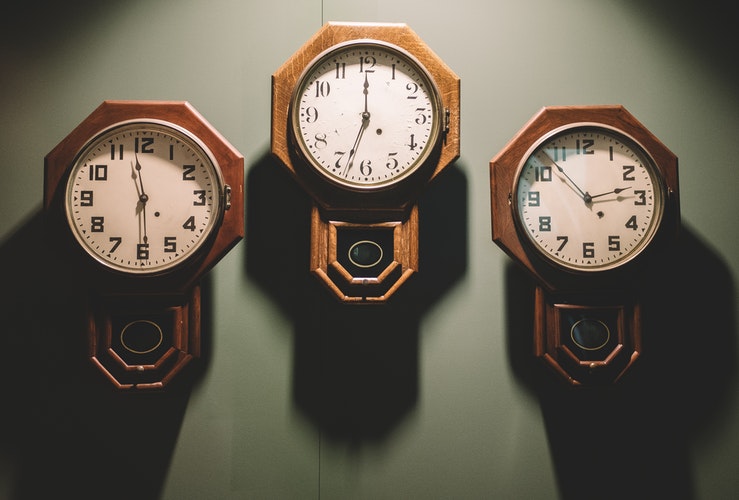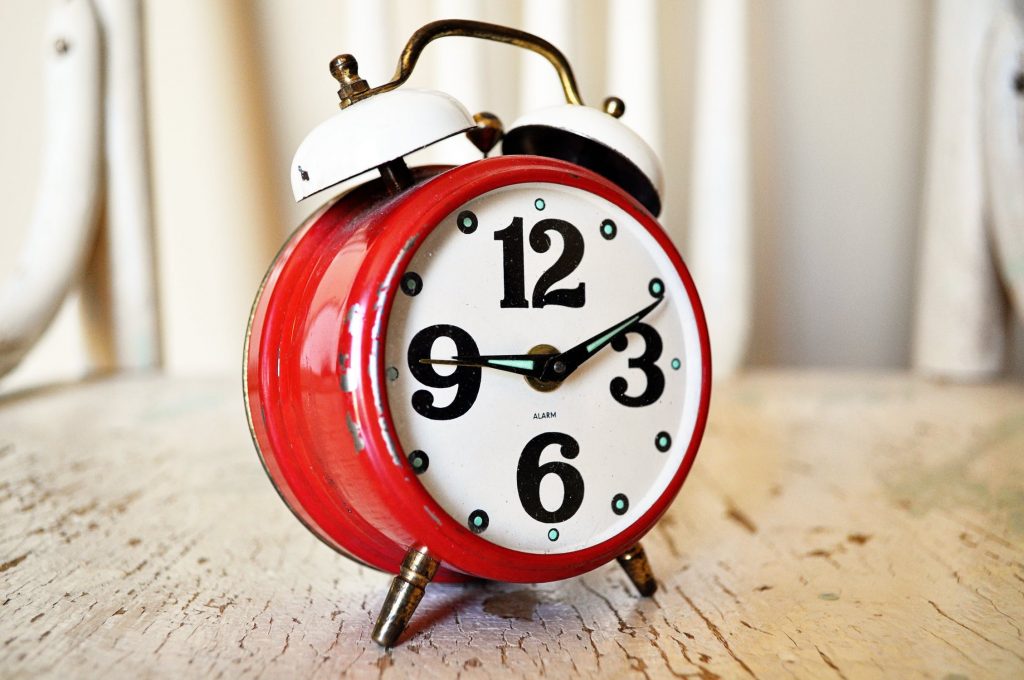We’ll be losing an hour of sleep soon as we put the clocks forward one hour. That’s right, it’s the start of British summer time! This means lighter afternoons and mornings. The only ‘fly in the ointment’ is the missed hour of sleep on the Saturday night during the change over. Daylight Saving Time means that most of Europe will ‘spring forward fall back’ as we change our clocks. Just make sure you don’t put your clock back one hour by mistake!
The Start of British Summer Time
On Sunday 26th March 2023, the UK will switch to Daylight Saving Time (GMT+1) by putting the clocks forward one hour from 1am to 2am.
Leaving behind Greenwich Meantime (GMT) and forging ahead one hour means that here in the UK, this is the official beginning of British Summer Time (BST).
People who put their clocks back by mistake at the weekend will find out soon enough – they will find they are two hours late for everything!
Time for a nap…
Indeed, it’s that time of year again – the start of British summer time. Spring is definitely here and it won’t be long before the start of summer in the UK.
This is the start of a whole new season of spring flowers and twittering birds, long warm evenings and the planning of summer holidays.
How to Remember if Clocks Go Forward or Back
In the UK, the clocks go forward one hour at 1am on the last Sunday in March, and back one hour at 2am on the last Sunday in October.
The clocks going forward in March means that people miss out on an hour of sleep, but as this happens early on Sunday morning, most people will thankfully get a lie in as they are less likely to be going to work.
The clocks go back again in October, which means bad news for night shift workers, who will most likely have to work an extra hour. Though they should get the time back the following March.
Although we’re used to changing the clocks twice a year, many people still forget which way to go. Indeed, there is always a question that gets asked around the last half of March and again in last half of October.
For people wondering how to remember which way the clocks change, read on!
Do the clocks go forward or back?
Well, there is an easy way to remember if you put your clocks forward one hour or back one hour. Just remember the simple rhyme: ‘spring forward, fall back’.
Of course, you need to know that ‘fall’ is the American word for autumn. As long as you remember not to fall forward and spring back, you’ll be fine!
Spring Forward Fall Back
For EFL students, using the rhyme ‘spring forward fall back’ might not be as easy as it sounds.
If we ‘spring’ forward, we jump, leap or lurch forward in a light-footed bound. But we could easily ‘fall’ forward too, in more of an uncontrolled, accidental motion, like tripping up while walking along.
Although it is easier to ‘fall’ back (when you start running more slowly, you ‘fall back’ in the race) you could also ‘spring’ back (when you jump back to avoid stepping on something).
So although the rhyme is ‘spring forward fall back’, linguistically it might not be so easy to remember for non-native English speakers.
Daylight Saving Time – How Did it Begin?
In the UK, the most hours of daylight (16 hours and 50 minutes) fall on the longest day in June (the summer solstice).
The fewest hours of daylight fall on the shortest day, Thursday December 21st. On this shortest day of the year, we only see seven hours and 49 minutes of sunlight.
At the end of March, the UK moves to Daylight Saving Time to preserve an extra hour of sunlight in the morning – we ‘spring forward’. The gives us British Summer Time. But this also means we lose an hour of sunlight in the evening.
So how did this all come about?
In 1907, the builder William Willett introduced the idea of British Summer Time, also known as Daylight Saving Time.
William Willet and The Waste of Daylight
Willet had taken up the idea from New Zealand entomologist George Vincent Hudson, who had originally devised the plan in 1895.
Willet was a great lover of the outdoors and was annoyed that so much time was wasted in bed in the early hours of the morning. Back in the early 20th century, the sun rose at 3am in mid-summer, so most people were still in bed.
The idea of Daylight Saving Time was intended as a way of not wasting the daylight hours by sleeping through them. Willet’s concern was also that people wasted money by burning fuel at night when they were still awake.
He published a pamphlet called The Waste of Daylight to highlight the problem.
Sadly, Willet died of flu in 1915, before he could enjoy the fruits of his campaigning. However, his proposals led to Germany adopting his clock-changing plan on April 30, 1916.Britain followed a month later on May 21 and France, Belgium, Luxembourg, Italy, Denmark, Netherlands, Norway, Portugal, Sweden, and Turkey all introduced a daylight saving plan.
The Summer Time Act of 1916 was passed by Parliament!
The current system of changing the clocks at the end of March and October has been in place since 1972.
Willett lived near Bromley in Kent and is today commemorated by a memorial sundial in nearby Petts Wood, which is set permanently to Daylight Saving Time in his honour.
There is a road in the town called Willett Way, named in honour of the time-changing pioneer.There is also a ‘Daylight Inn’ public house in Petts Wood, which boasts a large beer garden that Willet would have been pleased with – perfect for the light summer evenings!
Interestingly, Willett is the great-great-grandfather of Chris Martin, the lead singer of the famous rock band Coldplay.Coldplay released songs called Clocks and Daylight from their hit album A Rush of Blood to the Head.
Was the group saluting daylight campaigner Willet with these song titles – or is it just a coincidence?
Current Debate Around Daylight Saving Time
There has been much debate about whether we still need Daylight Saving Time. Questions include whether it should be dropped altogether or whether we should change the clocks permanently and always keep the hours of British Summer Time.
So, should we still continue to ‘spring forward fall back’?
A YouGov poll about Daylight Saving Time found that 50% of Britons support moving clocks forward an hour permanently while 38% oppose the change.
The task of changing the clocks back and forth is particularly difficult for the staff who work at the Queen‘s official residences, who spend over 50 hours adjusting over 1,000 clocks!
Following months of planning, in order to ‘spring forward fall back’ the Queen’s staff have to deal with 379 timepieces at Windsor Castle, 500 at Buckingham Palace and 80 at the Palace of Holyroodhouse.
These timepieces include organ clocks, astronomical clocks, musical clocks and mechanical clocks.
The Queen must be a stickler for punctuality!
Should We Change the Clocks Permanently?
In 2011, Conservative MP Rebecca Harris floated a bill calling for year-round Daylight Saving Time, but it failed to pass through Parliament and the idea was dropped.
Fixing the clocks to British summertime permanently would mean that dawn wouldn’t break in Scotland until nearly 9am. In some northern parts, the sun wouldn’t rise fully until 10am and dairy farmers would have to work for hours in the dark.
In contrast, arguments for dropping Daylight Saving Time altogether include that darker mornings are dangerous for children walking to school.
Some point out that any energy saved from Daylight Savings would be offset by people using fans and air-conditioning units during the lighter, warmer evenings (although this would be rare in the UK!)
For the moment, we will ‘spring forward fall back’ and keep changing the clocks twice a year. So the debate continues!
Tips for Dealing with the Time Change
Changing the clocks can cause problems with sleeping, waking and tiredness, especially for those who like to keep a strict bedtime schedule. Here are some tips to help you deal with the time change whenever we ‘spring forward fall back’.
When the clocks go forward at the start of Daylight Saving Time, the mornings will be darker, so you might need to set an alarm to help you wake up.
At the end of British Summer Time, the mornings are lighter. Ensure bedrooms are kept dark with blinds or curtains or you might wake up too early.
If you usually have a strict bedtime, change your hours by 15 minutes over a few days leading up to the clock change to allow your body to adjust to the new time. Instead of ‘springing forward’ in one hour on Sunday morning, this slower transitioning will be easier on your biological clock.
Another tip is to turn off your TV, laptop, tablet and mobile phone screens an hour before going to bed. This is because the blue light from bright screens has been shown to disrupt sleep.
Finally, make sure all the clocks are set to the new correct time before going to bed!

This might be confusing in the morning! – image source
Share your thoughts on changing the clocks
What do you think about the clocks going forward/back?
Do you think the UK should keep Daylight Saving Time? Should it become permanent? Or should we drop the whole idea and stay with GMT all year round?
Have you ever had a ‘wrong way’ situation with the clocks going back/forward?
Do you use the phrase ‘spring forward fall back’ to remember the time change? Or do you use a different method of remembering?
Do you think Coldplay’s songs are in reference to Chris Martin’s ancestor and daylight campaigner, William Willet?
Let us know your thoughts in the comments!
Attributions
- Cover of the 19th (and last) edition of the pamphlet “The Waste of Daylight”, written by William Willett, who independently conceived DST in 1905. The pamphlet advocated DST for Britain and reported progress toward that goal. William Willett (1858–1915) [Public domain], via Wikimedia Commons
- Memorial to William Willett in Petts Wood, London. Designed by G.W. Miller, unveiled 1927-05-21. The inscription HORAS NON / NUMERO / NISI ÆSTIVAS [AE elided] can be translated “I tell only the summer hours.” Lower down is inscribed “SUMMER TIME ACT 1925”. Image by P Ingerson at English Wikipedia [Public domain], via Wikimedia Commons
- The Daylight Inn, Station Square, Petts Wood, BR5. Image by Mike Quinn via Geograph.org.uk and licensed for reuse under Creative Commons Licence [CC BY-SA 2.0]
- Chris Martin at a concert in England, 2008 by FEbensperger [Public domain], from Wikimedia Commons.
- Windsor Castle at sunset as viewed from the Long Walk in Windsor, England. Photo by David Iliff [GFDL, CC-BY-SA-3.0 or CC BY 2.5], from Wikimedia Commons



![The Waste of Daylight by William Willett (1858–1915) [Public domain], via Wikimedia Commons William Willet - The Waste of Daylight pamphlet](http://www.myenglishlanguage.com/wp-content/uploads/2012/10/Waste-of-Daylight-William-Willet.jpg)
![Image by P Ingerson at English Wikipedia [Public domain], via Wikimedia Commons William Willet Memorial - Petts wood](http://www.myenglishlanguage.com/wp-content/uploads/2012/10/willet-memorial.jpg)
![Image by Mike Quinn via Geograph.org.uk (http://www.geograph.org.uk/photo/2427810) [CC BY 2.0] The Daylight Inn, Petts Wood](http://www.myenglishlanguage.com/wp-content/uploads/2012/10/Daylight-Inn-Petts-Wood.jpg)
![Image by FEbensperger [Public domain], from Wikimedia Commons Chris Martin of Coldplay - "clocks"](http://www.myenglishlanguage.com/wp-content/uploads/2012/10/chris-martin-coldplay.jpg)
![Image by David Iliff [GFDL (http://www.gnu.org/copyleft/fdl.html), CC-BY-SA-3.0 (http://creativecommons.org/licenses/by-sa/3.0/) or CC BY 2.5 (https://creativecommons.org/licenses/by/2.5)], from Wikimedia Commons Windor Castle](http://www.myenglishlanguage.com/wp-content/uploads/2012/10/windsor-castle-large.jpg)